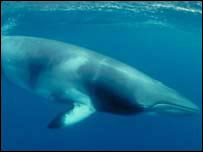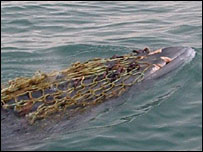|
Hopes to resume search for entangled whale
BBC NEWS
9th August 2003
Rescuers are hoping to spot stricken whale from the air.
Marine experts are hoping to launch a fresh aerial search
on Saturday for a Minke whale caught up in a fishing net
off the coast of west Wales.
Gwyndaf Williams, the pilot of the twin-engine Piper Seneca chartered in an effort to locate and rescue the stricken mammal has said he will stay up for as long as necessary.
The crew have had numerous setbacks throughout the week because of fog caused by the hot weather.
Visibility was seriously hampered on several occasions when the crew hoped to try and spot the small whale, which is thought to be about five miles off the coast between Cardigan Bay and Aberaeron.
An attempt to get the plane airborne will be made at midday on Saturday - more than a week after the whale was first spotted.
The crew will attempt to cover a 200sq mile area of sea.
The whale could have swallowed part of the fishing net.
There has not been a confirmed sighting of the whale since Tuesday.
Marine experts fear the whale animal is facing a slow death from starvation and exhaustion.
It is thought the whale may have swallowed part of the net in which it is caught. Thousands of whales, dolphins, and porpoises are washed up on beaches every year in similar conditions.
Environmentalists, led by the Wildlife Trusts, have been campaigning for changes in commercial fishing practices to prevent such tragedies, known as by-catch deaths.
The animals often follow shoals of fish caught by trawlers and get tangled in the vast nets.
Their injuries are often so severe that they bleed to death.
Eye-witnesses have said the Cardigan Bay whale appears to be very thin and may have been unable to feed.
If the air search team does finally manage to locate it, they will direct a boat rescue team to the site to try and cut the whale free.
Mark Simmonds, science director of the Whale and Dolphin Conservation Society, said: "It can often be difficult to find an individual animal from a boat.
"Only a small proportion of the body can be seen from such a low platform and as there is such a vast area of sea to cover."
"In order to help the animal we need to firstly find it and then gain a more accurate assessment of its situation and condition."
Inspector Abbott said they planned to use GPS tracking devices sent over from the United States to monitor the whale's movements and aid the rescue attempt.
He added: "If we could just put the tag on it, then at least we'd be able to keep track of exactly where it is - that would be an achievement.
"But where we're going to search is a massive area."
Adult Minke whales are usually between seven and ten metres long and can weigh up to 10 tonnes when fully grown.
These are just one of over 20 different species of whales, dolphins and porpoises that can be found in UK waters.
Unfortunately they face a range of threats including or accidental capture in fishing nets, chemical and noise pollution and vessel strikes.
Top
|

